Plastic Electronics at the Imperial Festival 2017
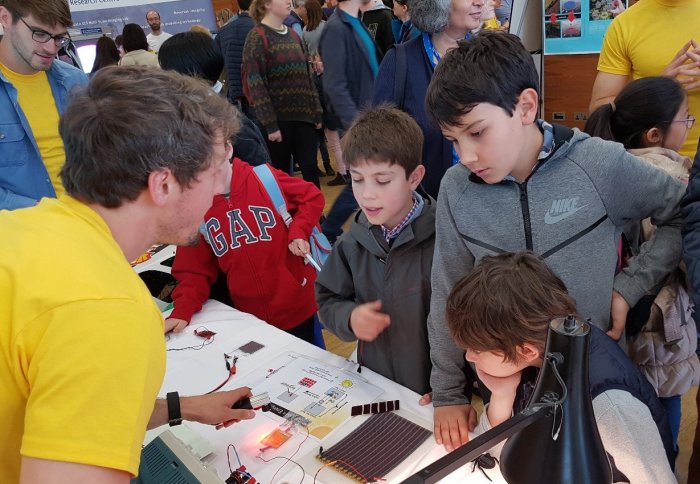
Students, postdocs and academic staff from several research groups in the CPE entertained and enlightened the public at this year's Imperial Festival.
PE-CDT Cohort 8's Stand: "Plastic Fantastic – The Future of Electronics"
by Joel Luke
The Imperial Festival saw thousands of people flock to the college to share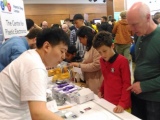 in the exciting research going on at Imperial. The CPE was represented by Cohort 8, who organised and ran the stand ‘Plastic Fantastic – the future of electronics’. With the success of OLED displays at the heart of the stand, Cohort 8 showed how high tech displays can be made from fluorescent polymers. An interactive timeline encouraged people to think about how their lives have been revolutionised by improving display technology and how flexible and transparent displays are set to
in the exciting research going on at Imperial. The CPE was represented by Cohort 8, who organised and ran the stand ‘Plastic Fantastic – the future of electronics’. With the success of OLED displays at the heart of the stand, Cohort 8 showed how high tech displays can be made from fluorescent polymers. An interactive timeline encouraged people to think about how their lives have been revolutionised by improving display technology and how flexible and transparent displays are set to 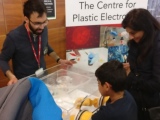 continue to change their lives. The audience learnt how displays are built, using a microscope to show the pixel layout on their own mobile phones, but the most popular part of the stand was definitely the mock-up glove box. This saw children, and some adults, experience what it’s like to be a scientist, and compete for some prizes in a timed glovebox challenge.
continue to change their lives. The audience learnt how displays are built, using a microscope to show the pixel layout on their own mobile phones, but the most popular part of the stand was definitely the mock-up glove box. This saw children, and some adults, experience what it’s like to be a scientist, and compete for some prizes in a timed glovebox challenge.
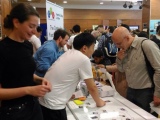
The stand was busy all day, and the cohort were able to convey their knowledge and enthusiasm to the public. Everyone who worked on the stand has said how much fun it was, and cohort 8 are already looking forward to next year’s festival.
"A Solar-Powered Future" - presented by reserachers from Chemistry, Physics and Chem Eng
by Madeleine Morris
On a sunny weekend in May, 17 solar energy researchers from across the departments of chemistry, chemical engineering and physics participated in this year’s Imperial Festival. With an estimated 18,000 visitors over the weekend, this was an excellent chance to not only showcase our current research, but also have a conversation with the public about the wider context of solar energy and its importance in our futures.
Solar Energy Conversion
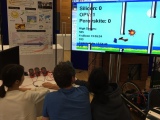 Building on previous years’ Festival activities, our stall demonstrated the concepts behind solar energy conversion as well as the practical applications. We had two main focuses: 1) non-silicon photovoltaics (PV) and 2) solar-driven water splitting, aligning well with the research conducted by the majority of the volunteers. Version 2 of our home-built computer game (FlappyPV) was premiered to great success, with visitors (and volunteers!) altering the light levels incident on silicon, organic and perovskite solar cells to navigate through a series of obstacles. Thanks to some stability and sensitivity issues, the jury is still out on which technology was the winner...
Building on previous years’ Festival activities, our stall demonstrated the concepts behind solar energy conversion as well as the practical applications. We had two main focuses: 1) non-silicon photovoltaics (PV) and 2) solar-driven water splitting, aligning well with the research conducted by the majority of the volunteers. Version 2 of our home-built computer game (FlappyPV) was premiered to great success, with visitors (and volunteers!) altering the light levels incident on silicon, organic and perovskite solar cells to navigate through a series of obstacles. Thanks to some stability and sensitivity issues, the jury is still out on which technology was the winner...
Hands-on Activities
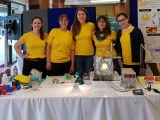 We had live water-splitting demos which showed some of the different approaches to generating hydrogen from water. A simple pencil and battery setup demonstrated electrolysis as it is most commonly carried out now (i.e. using non-renewable electricity). Connecting a solar PV panel demonstrated a simple way to make the process ‘greener,’ and a lab-built photoelectrochemical reactor introduced the ‘all-in-one’ approach currently being investigated by many researchers in the College. Visitors could then drive a remote controlled hydrogen-powered toy car to see how hydrogen could contribute to the inevitable overhaul of our current transport system to a low carbon one.
We had live water-splitting demos which showed some of the different approaches to generating hydrogen from water. A simple pencil and battery setup demonstrated electrolysis as it is most commonly carried out now (i.e. using non-renewable electricity). Connecting a solar PV panel demonstrated a simple way to make the process ‘greener,’ and a lab-built photoelectrochemical reactor introduced the ‘all-in-one’ approach currently being investigated by many researchers in the College. Visitors could then drive a remote controlled hydrogen-powered toy car to see how hydrogen could contribute to the inevitable overhaul of our current transport system to a low carbon one.
Public Engagement
Each year, the Festival gives the public the opportunity to directly hear about and see what is really going on in the labs from the researchers carrying out the investigations. And each year, it gives us – the researchers – the chance to publicise our work and listen to the opinions of the public. This not only helps to improve our skills in science communication, but could even prompt us to consider a problem or challenge from another point of view. Crucially, it also gives us the chance to bridge the (rather large) gap between public and scientific opinion by having a two-way conversation.
I will always strongly encourage researchers to participate in outreach activities throughout their careers. The Imperial Festival is a particularly fun one to do!
Article supporters
Article text (excluding photos or graphics) © Imperial College London.
Photos and graphics subject to third party copyright used with permission or © Imperial College London.
Reporter
Dr Joel Luke
Department of Physics
Madeleine Morris
The Grantham Institute for Climate Change
Dr Steph Pendlebury
Faculty of Engineering